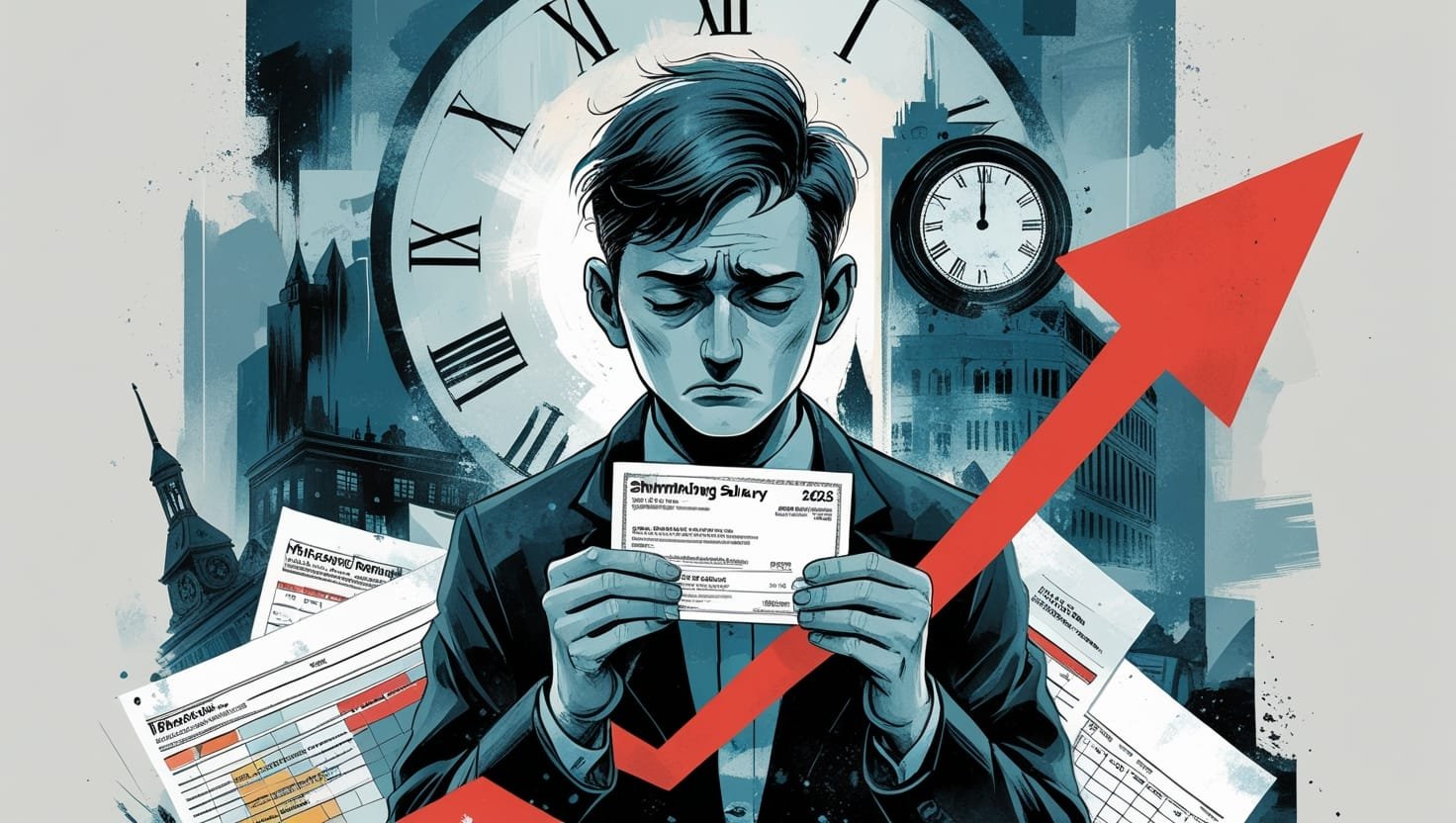Inflation in 2025 – How Inflation is Secretly Eating Your Salary in 2025 📉
In the ever-evolving economic landscape of 2025, inflation remains a subtle yet pervasive force, quietly eroding the value of your hard-earned salary. This invisible tax reduces what your income can buy, often unnoticed until everyday expenses like groceries or rent become harder to manage. This article explores how inflation impacts your purchasing power, backed by current data and real-world insights, and offers actionable strategies to safeguard your financial future. Emerging technologies like blockchain in corporate finance, alongside 2025 blockchain finance trends, provide innovative ways to combat inflation’s effects, despite regulatory challenges in blockchain adoption.
📈 Want to know your Inflation Adjusted Salary instantly?
Try our Inflation Salary Growth Calculator – Fast, Free & Simple!
The Silent Erosion: How Inflation Impacts Your Salary 💸
Inflation is the rate at which the general level of prices for goods and services rises, causing a decline in purchasing power. When inflation outpaces wage growth, your real income shrinks, meaning your salary buys less than it did before. For example, if your annual raise is 2% but inflation runs at 3%, you’re effectively taking a 1% pay cut in real terms. This erosion is gradual, often masked by nominal salary increases that feel rewarding but fail to match rising costs for essentials like housing, food, and transportation. In 2025, supply chain pressures and energy costs are driving prices upward, making it tougher for households to maintain their standard of living.
The Economic Landscape of 2025: Inflation and Wage Growth 📊
Forecasts for 2025 indicate a moderated but persistent inflationary environment. In the United States, inflation is expected to hover around 2.8%, potentially climbing to 3.3% by year-end due to tariff impacts and rising core prices (excluding food and energy). Globally, headline inflation is projected to ease to 4.4%, yet it still poses a significant drag on personal finances. These figures reflect a sticky inflation trend, resisting a return to pre-pandemic lows despite central bank efforts. For salaried workers, even modest raises may not keep up, as the real value of income declines.

To understand the long-term trend, consider historical U.S. inflation and wage growth data from 2020 to 2025 (with 2025 as a projected average):
| Year | Inflation Rate (%) | Wage Growth (%) |
|---|---|---|
| 2020 | 1.2 | 3.9 |
| 2021 | 4.7 | 3.9 |
| 2022 | 8.0 | 5.1 |
| 2023 | 4.1 | 3.9 |
| 2024 | 3.4 | 3.5 |
| 2025 | 2.8 (projected) | 3.3 (projected) |
📈 Want to know your Inflation Adjusted Salary instantly?
Try our Inflation Salary Growth Calculator – Fast, Free & Simple!
U.S. Inflation Rates: 2020-2025
2020: 1.2%
2021: 4.7%
2022: 8.0%
2023: 4.1%
2024: 3.4%
2025: 2.8%
This data highlights inflation’s volatility, peaking in 2022 due to post-pandemic recovery and geopolitical events, followed by a gradual decline. However, even at lower levels, consistent inflation above wage growth erodes savings and spending power over time.
Real-Life Impact: Maria’s Story 🏠
Consider Maria, a mid-level marketing manager in Chicago. In 2024, her $85,000 salary comfortably covered rent, groceries, and student loans. By mid-2025, with inflation at 2.8%, her essential costs rose by about $2,500 annually, but her salary only increased by 2%. This gap forced Maria to cancel subscriptions and postpone a family vacation, reflecting broader trends where wage growth lags behind inflation, reducing purchasing power.
📈 Want to know your Inflation Adjusted Salary instantly?
Try our Inflation Salary Growth Calculator – Fast, Free & Simple!
Case Study: Blockchain in Corporate Finance at JPMorgan Chase 🔗
Companies are leveraging blockchain in corporate finance to counter inflation’s effects on operations, indirectly supporting employee salaries. JPMorgan Chase’s Onyx platform uses blockchain to streamline cross-border payments and trade finance. In 2025’s high-inflation environment, where currency volatility and supply chain costs are elevated, Onyx reduces transaction times from days to minutes and cuts fees by up to 80%. By tokenizing assets and using smart contracts, JPMorgan has processed over $1 trillion in transactions, enhancing efficiency and lowering costs. These savings enable the firm to maintain competitive salaries and invest in retention, creating a more stable financial ecosystem for workers.
Blockchain in Corporate Finance: A New Frontier for Resilience 🌐
Blockchain technology, known for cryptocurrencies, offers a decentralized, transparent ledger system that revolutionizes corporate finance. It enhances supply chain finance, streamlines payments, and improves auditability. A key blockchain finance trend in 2025 is tokenization of real-world assets (RWAs), like real estate or commodities, unlocking liquidity and enabling fractional ownership. This reduces transaction costs and offers investment avenues less affected by inflation. Blockchain’s immutable records also reduce fraud and errors in financial reporting, fostering trust among stakeholders.
Navigating Regulatory Challenges in Blockchain Adoption ⚖️
Despite its potential, blockchain faces regulatory challenges, including inconsistent global standards, data privacy concerns, and compliance with anti-money laundering (AML) and know-your-customer (KYC) rules. The lack of a unified regulatory framework creates uncertainty, increasing compliance costs and delaying adoption. However, governments are exploring pilot programs and sandboxes to balance innovation with risk mitigation, paving the way for broader blockchain use in finance.
Actionable Steps to Protect Your Salary 🛡️
Protecting your salary from inflation in 2025 requires proactive steps. Review your budget to identify areas for cuts without sacrificing quality of life. Prioritize high-interest debt repayment, as inflation can amplify borrowing costs. Negotiate for raises that exceed inflation, using current data to strengthen your case. Invest in inflation-protected securities like Treasury Inflation-Protected Securities (TIPS), which adjust based on CPI changes. Diversify into assets like stocks, real estate, or stablecoins, which benefit from blockchain finance trends in 2025, such as DeFi and on-chain bonds. Finally, explore side income streams or skill-building to boost earning potential, ensuring your financial portfolio outpaces rising prices.
📈 Want to know your Inflation Adjusted Salary instantly?
Try our Inflation Salary Growth Calculator – Fast, Free & Simple!
Frequently Asked Questions ❓
How does inflation affect my salary in 2025?
Inflation reduces your salary’s purchasing power, meaning your money buys fewer goods and services if wage growth doesn’t keep pace.
What is the projected inflation rate for 2025?
Projections for 2025 suggest U.S. inflation around 2.8% to 3.3%, with global rates at about 4.4%.
Why is understanding inflation’s impact important?
It helps you make informed decisions about budgeting, saving, and investing to protect your real income.
What’s the difference between nominal and real salary?
Nominal salary is your actual earnings, while real salary is adjusted for inflation, reflecting true purchasing power.
How can I protect my salary from inflation?
Negotiate raises above inflation, invest in inflation-indexed assets, and manage debt effectively.
What is blockchain in corporate finance?
Blockchain in corporate finance uses decentralized ledger technology to enhance transparency, efficiency, and security in financial processes like payments and auditing.
How does blockchain transform corporate finance operations?
It enables real-time settlements, automates contracts, and provides immutable records to reduce fraud and streamline compliance.
What are the benefits of blockchain in corporate finance?
Benefits include cost savings, improved data accuracy, and enhanced stakeholder trust, leading to better decision-making.
Why is blockchain in corporate finance gaining popularity?
It handles complex transactions securely, addressing issues like slow payments and opaque supply chains.
How can small businesses adopt blockchain in corporate finance?
They can start with simple applications like digital invoicing or token-based funding via user-friendly platforms.
What role does blockchain play in corporate finance auditing?
It creates tamper-proof audit trails, enabling instant transaction verification and regulatory compliance.
Are there risks in blockchain for corporate finance?
Risks include integration challenges, security vulnerabilities, and evolving regulatory constraints.
How is AI integrated with blockchain in corporate finance?
AI analyzes ledger data for predictive insights, automates fraud detection, and optimizes financial modeling.
What future developments are expected for blockchain in corporate finance?
Expect widespread asset tokenization, network interoperability, and hybrid public-private blockchain models.
How does blockchain in corporate finance impact shareholder relations?
It enables transparent voting and real-time dividend distributions, fostering accountability.
What are the top blockchain finance trends in 2025?
Trends include tokenized real-world assets, stablecoin payments, and advanced DeFi protocols.
How will blockchain finance trends in 2025 affect traditional banking?
They’ll push banks toward faster, cheaper alternatives, potentially leading to hybrid systems.
What blockchain finance trends in 2025 should investors monitor?
Monitor central bank digital currencies, AI-blockchain fusions, and sustainable blockchain initiatives.
Why are blockchain finance trends in 2025 focused on sustainability?
Growing environmental concerns drive innovations like energy-efficient blockchains and carbon credit tokenization.
How do blockchainTrends in 2025 influence cross-border transactions?
They enable near-instant settlements and lower fees, making international trade more accessible.
What innovations define blockchain finance trends in 2025?
Innovations include layer-2 scaling, privacy technologies, and blockchain-IoT integration for automated finance.
Are blockchain finance trends in 2025 accessible to non-tech companies?
Yes, through user-friendly platforms and as-a-service models that simplify adoption.
How might blockchain finance trends in 2025 change investment strategies?
They introduce fractional ownership via tokens and diversify portfolios with crypto-linked products.
What global factors drive blockchain finance trends in 2025?
Regulatory clarifications, economic digitization, and financial inclusion in emerging markets.
How can professionals stay updated on blockchain finance trends in 2025?
Follow industry reports, attend virtual conferences, and subscribe to fintech newsletters.
What are the main regulatory challenges in blockchain?
Challenges include inconsistent global standards, data privacy concerns, and AML/KYC compliance.
How do regulatory challenges affect blockchain adoption?
They create uncertainty, increase compliance costs, and delay project implementation.
What specific regulatory challenges face blockchain in finance?
Issues include classifying digital assets, ensuring KYC compliance, and addressing tax implications.
Why are regulatory challenges a barrier for blockchain startups?
High compliance costs and lengthy approvals can invalidate business models.
How are governments addressing regulatory challenges in blockchain?
Through pilot programs, sandboxes, and international collaborations to harmonize standards.
